Published on Sept. 8, 2020
“We are better together.”
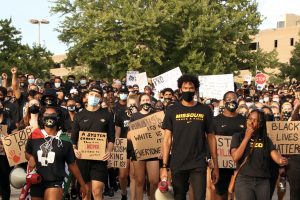
(Photo/Becca Newton)
That was the message that the MU Black Student-Athlete Association (BSAA) wanted to spread at Wednesday’s march. The march started at the Columns and ended at Memorial Field. Students, faculty, and people from all walks of life gathered for a common cause: to advocate for change.
Since the deaths of Breonna Taylor, George Floyd and the recent shooting that left Jacob Blake paralyzed, protests have taken place across the country; Columbia included.
This march was the first planned event by the BSAA since its creation in August. The organization – made of MU student-athletes Cason Suggs, Keiarra Slack, Olivia Evans, Atina Kamasi, Arielle Mack and Kobie Whiteside – was created to bridge the divide between Black athletes and their identities as individuals on campus.
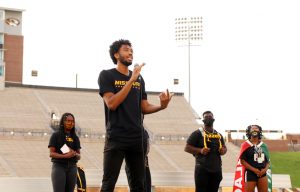
(Photo/Becca Newton)
“Black athletes are often misunderstood outside of the game,” BSAA President, Cason Suggs said. “We wanted to give a voice to those athletes at Mizzou. Atina and I established the Mizzou BSAA. Arielle, Keiarra and Olivia joined soon after and the rest is history.”
Suggs is a member of the MU Men’s Track and Field team and a Diversity scholar under the Center for Academic Success & Excellence (CASE) department.
MU Junior Olivia Evans, also a CASE scholar with the Brooks scholarship, is a thrower on the Women’s Track and Field team and BSAA’s Public Relations Chair. Getting the word out for the march was her first task in her new role.
“They reached out to me with the idea and we could see that this was going to be something big, that this was going to be something bigger than us,” Evans said. “I knew I wasn’t going to be on the ground necessarily with organizing everything behind the scenes but I knew I could help with media so I wanted to do the best that I could to shine a light on it for the group.”
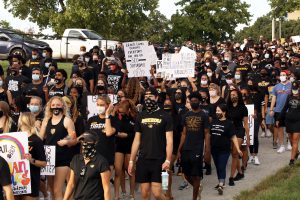
(Photo/Becca Newton)
Sophomore, Momola Adesanmi, was among those who took part in the event. She is a defender for MU’s Women’s Soccer team and a Brooks scholar.
“The Black Student-Athlete Association is something new that we recently added to our athletic stuff, and I felt like the things that the executive board has been talking about are things that have been brewing,” Adesanmi said. “I wanted to take part. I felt like coming here and protesting with my fellow teammates and my fellow student-athletes was a way that I could take part in it.”
With BSAA only a month out since its creation and with just a few days to organize the protest, Adesanmi was touched by the turnout.
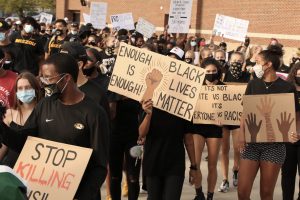
(Photo/Becca Newton)
“I’m incredibly encouraged, just with how quick this was announced -it was like Saturday or Sunday- and how many people are here, it is very encouraging to see,” Adesanmi said. “Especially the young people too, I mean, we are the next generation, I know it sounds cliche but it’s good to see people out here, to see my peers care as well. Also, some of my coaches are out here too so that shows a lot.”
A sea of black t-shirts and pants filled the street when marching. Chants echoed throughout Tiger Avenue. Cries of, “No justice, no peace,” “What do we want? ‘Justice!’ When do we want it? ‘Now!’” and “Enough is enough” were heard as everyone marched towards Memorial Field. People carried signs with messages such as, “Silence is violence” and “Every Black life matters, not just on SEC Saturday.”
The latter aligns with Suggs’ sentiments as a Black athlete.
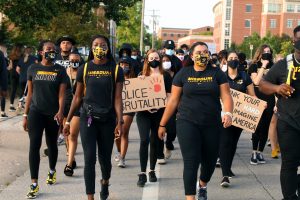
(Photo/Becca Newton)
“I feel like at times our status and our expressions in the game overshadow our emotions and concerns outside of the game,” Suggs said during his speech at Memorial Field. “You can see a picture of a wide receiver -you know – high stepping into the endzone, and you can see a video of a basketball player hitting the game-winning shot… but when we leave the arena, that title of athlete that we came in with, that we had on the court, it stays on the court, it stays in the field…because when we leave, we don’t have that title anymore, but just Black.”
The powerful and uplifting energy felt throughout the night, gives Evans hope for the future and the status of Black athletes at MU.
“Honestly, we kept hearing numbers like ‘It’s going to be five hundred, it’s going to be this many’ and to be completely honest, I was like ‘Okay, sure’ but I didn’t really believe it,” Evans said. “Seeing is believing, when I saw it, that’s when I realized how much support we really do have.”
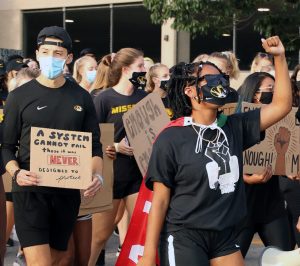
(Photo/Becca Newton)
What the BSAA members wanted everyone to remember as they returned home was that no matter who they are, they have the power to invoke change. No matter if someone is from a small town or a celebrity with millions of followers, they should speak up for what they believe is right.
“I think that every pebble dropped in water leaves a ripple and you never know how far that ripple’s going to go, I don’t want anyone to feel that their voice doesn’t matter and I think that all of us together standing up and speaking, I hope that encourages others to speak up as well,” Suggs said.
Evans’ speech at Memorial Field wrapped up the march with a message of unity and collaboration, of elevating each other and fighting hand in hand knowing nobody is alone in their fight.
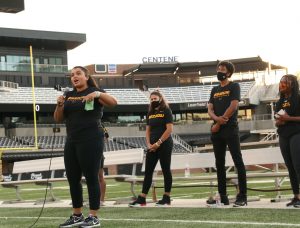
(Photo/Becca Newton)
“As we, the student-athletes of Mizzou, continue to work for change, we ask all of you to join us,” Evans said. “Join us as one collective Mizzou, join us as one collective Columbia, join us as one collective team because you know why? With everyone working together, we can leave our community and our nation better than we found it because, say it with me, we are better together. We wouldn’t be here in this moment right now if it wasn’t for all the support from our community. We are better together.”
After Wednesday, the BSAA members and everyone who participated in the march can stand proud and know they dropped a pebble that started a ripple of activism at MU, and they did it together.